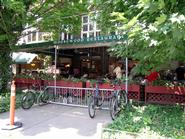
Laura Hartz '07 (Keene, N.H.) doesn't like the term "foodie" but she admits that she probably is one. Last February, Hartz took the next step by applying for an Emerson grant, which she subsequently received, to explore the local food culture and agricultural community of Ithaca, N.Y., and the Finger Lakes region.
Hartz worked with Associate Professor of English Naomi Guttman, who co-taught Hartz's Sophomore Seminar "Food for Thought." Hartz and Guttman had discussed doing Emerson-funded research for some time and eventually decided on the Slow Food Movement in Upstate New York.
The Slow Food Movement was started by Italian Carlo Petrini in the 1980s. In reaction to the invasion of fast food, Petrini offered a four-pronged interdisciplinary initiative to "promote gastronomic culture, develop taste education, conserve agricultural biodiversity, and protect traditional foods from extinction." The movement spread around the world and, according to their website, has 83,000 members in 50 countries.
Hartz had originally planned to focus her study on the Finger Lakes Slow Food "club" or Convivium, having attended one of their banquets earlier in the year. She found, however, a "better way to find the inside story on local food culture" by working at the Moosewood Restaurant in Ithaca, N.Y. The Moosewood is an internationally-renowned vegetarian café which has helped bring vegetarian cooking to the American mainstream, as well as acting as a "poster child for locally-based vegetarian cookery."
She worked at the Moosewood part-time as a cook, prep cook, and salad prep. The rest of the time Hartz spent "submerging [herself] in the food culture and local agriculture community." She interviewed a number of people: members of the Moosewood Collective (many of whom were also her co-workers), the director of the Finger Lakes Slow food Convivium, a member of the Canadian Slow Food Organization, and the directors of the Cornell Cooperative Extension's Agriculture and Horticulture division. Hartz also spent time observing the two Ithaca-area farmer's markets and researched the history of the Slow Food Movement.
The outcome of Hartz's investigation will be three articles in which she expresses and organizes the results of her many interviews. The first two articles, started and partly written, are titled, "Inside the Moosewood Kitchen" and "Slow Food by any Other Name." The third, which Hartz plans to continue researching now that she has returned to Hamilton, will deal with child involvement in Slow Food-like organizations.
This is not Hartz's first experience of summer research, or even of research that demands immersion. She spent last summer in the El Verde Field Research station in Puerto Rico, researching rainforest terrestrial arthropod ecology. "This summer," Hartz said, "the research has been of a somewhat different nature – working more with people and food than bugs and dirt." She added that she appreciated having a science background to help her think critically about her findings.
Although Hartz, a double major in biology and English, plants to embark upon a new topic for her biology senior project, she will continue her "cooking hobby" at Hamilton. She is already active in the college culinary scene as a barista at Café Opus, and, appropriately enough, an organizer of the Woollcott Co-op and the Underground Café. Hartz is also a tutor at the Writing Center, a volunteer ESL tutor, and a member of the Outing Club and the Hamilton Environmental Action Group. A rising senior, Hartz hopes to attend graduate school for public health or international nutrition. Her long-range plans involve teaching and opening her own organic bakery or sandwich shop.
Her research is funded by the Emerson Foundation Grant Program, which allows students to work closely with a faculty member researching in depth an area of the student's interest.
-- Lisbeth Redfield
Posted August 31, 2006
